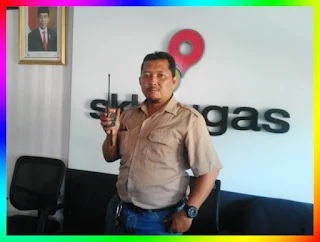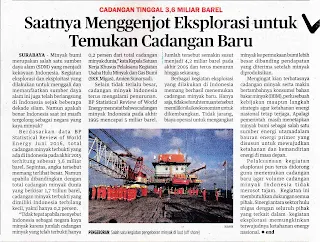PT Pertamina terus mematangkan kerjasama di proyek terminal LNG di Bojonegara, Banten. Terminal LNG tersebut merupakan proyek dari Salah satu anak usaha Kalla Group, yaitu PT Bumi Sarana Migas (BSM). Wakil Direktur Utama Pertamina, Ahmad Bambang bilang, saat ini pihaknya masih dalam proses perundingan dengan Bumi Sarana Mandiri. Salah satu item pembahasannya adalah keikutsertaan Pertamina di proyek tersebut dengan memiliki saham. Menurut Bambang proses pembicaraan bisnis masih berlangsung.
Soalnya, ini terkait pembicaraan proyek bisnis yang cukup besar seperti proyek LNG Bojonegara. Apalagi Pertamina juga membutuhkan proyek tersebut untuk bisa memenuhi kebutuhan LNG bagi perusahaan pelat merah ini. Jadi karena juga butuh, kami maunya mempunyai saham juga di proyek tersebut. Salah satu pertimbangkan bisnis Pertamina bila ingin terlibat di proyek tersebut soal perhitungan dari nilai proyek tersebut yang ditaksir sekitar Rp 10 triliun.
Selain itu, perusahaan energi ini juga harus memperhitungkan kepemilikan asing di proyek tersebut. Antisipasi defisit gas Yang jelas, kata Ahmad Bambang, pihaknya masih berunding dengan berbagai pemangku kepentingan di proyek tersebut untuk menentukan besaran saham. Pilihannya beragam. Mulai dari komposisi saham dari masing-masing pemangku kepentingan, antara Bumi Sarana Migas, Pertamina dan perusahaan asal Jepang. Atau juga dengan opsi Seluruh saham Pertamina kuasai.
Ada lagi pilihan Pertamina tetap menggandeng Bumi Sarana Migas tapi tidak menyertakan pihak Jepang. Melihat pilihan komposisi saham yang terbilang banyak tersebut, Bambang menyebutkan kemungkinan proses perundingan bakal berlangsung lama. Bambang menegaskan hingga saat ini Pertamina dan BSM belum mencapai kesepakatan baik dalam kepemilikan saham maupun sebagai pembeli atau offtaker terminal LNG Bojonegara tersebut.
Vice President Corporate Communication Pertamina, Wianda Pusponegoro menyatakan, hingga kini belum ada kontrak mengikat antara Pertamina dengan Bumi Sarana Migas tersebut. Apalagi sebagai offtaker. Belum ada kesepakatan terkait hal-hal tersebut. Juru bicara PT Bumi Sarana Migas Nanda Sinaga membantah telah terjadi kesepakatan kerjasama antara Bumi Sarana Migas dengan Pertamina. Kalau ada update pasti ada penjelasan dari Kalla Group dan Pertamina.
Kalla Group melalui Salah satu anak perusahaannya PT Bumi Sarana Migas (BSM) sudah siap membangun proyek fasilitas regasifikasi gas alam cair atau Land based LNG /receiving and regasifiation terminal berkapasitas 500 mmscfd atau kurang lebih 4 juta ton di Bojonegara, Banten. Bila tidak ada halangan, proyek ini siap berjalan di awal tahun 2017 mendatang. Proyek senilai Rp 10 triliun tersebut rencananya bisa terpenuhi dari setoran modal para pemegang saham serta dari pinjaman Jepang dalam hal ini adalah Lembaga Keuangan Pemerintah Jepang serta perbankan asal negeri matahari terbit tersebut.
Proyek ini dibangun untuk mengantisipasi ancaman defisit gas di Jawa bagian Barat. Berdasarkan data dari Kementerian ESDM dan kajian Wood MacKenzie mengenai proyeksi suplai gas tahun 2013 sampai dengan tahun 2030, Jawa bagian Barat, akan mengalami defisit neraca gas karena berkurangnya cadangan gas dari Sumatera. Juga meningkatnya permintaan terhadap sumber energi itu.
IN ENGLISH
Pertamina Learn Stock Purchase Project Kalla Group
PT Pertamina continues to finalize the cooperation in the LNG terminal project in Bojonegoro, Banten. The LNG Terminal is a project of One Kalla Group subsidiary, namely PT Bumi Sarana Migas (BSM). Deputy CEO, Ahmad Bambang said, the company is still in the process of negotiating with the Earth Sarana Mandiri. One discussion item Pertamina's participation in the project with own shares. According to Bambang business talks process is still ongoing.
You see, this conversation related business projects such as the LNG project is large enough Bojonegara. Moreover, Pertamina also requires the project to meet the needs LNG for SOEs. So therefore also needs, our wants also has stakes in the project. One business Pertamina consider before getting involved in the project about the calculation of the value of the project is estimated at around Rp 10 trillion.
In addition, energy companies must also take into account the foreign ownership in the project. Anticipation gas deficit Clearly, Ahmad said Bambang, the company is still negotiating with various stakeholders in the project to determine the amount of shares. The choice is varied. Starting from the stock composition of each stakeholder, between Earth Means Migas, Pertamina and a Japanese company. Or also with the option shares are mastered Pertamina.
There is another option still holding Pertamina Bumi Sarana Migas but does not include the Japanese side. View a selection of the composition of the stock is fairly a lot, Bambang said the possibility of the negotiation process will be long. Bambang confirmed until now Pertamina and BSM have not reached an agreement either in ownership or buyer or offtaker Bojonegara the LNG terminal.
Vice President Corporate Communications of Pertamina, Wianda Pusponegoro states, until now no binding contract between Pertamina and the Oil and Gas Facility Earth. Moreover, as a taker. There has been no agreement on such matters. PT Bumi Sarana spokeswoman Nanda Migas Sinaga denied there was an agreement of cooperation between the Earth Means Migas and Pertamina. If there is an update must be an explanation of Kalla Group and Pertamina.
Kalla Group through one of its subsidiaries PT Bumi Sarana Migas (BSM) project is ready to build liquefied natural gas regasification facility or Land-based LNG / receiving and regasifiation terminal with a capacity of 500 MMSCFD or approximately 4 million tons in Bojonegara, Banten. If there are no obstacles, the project is ready to run at the beginning of the year 2017. Projects worth Rp 10 trillion are planned to be met from capital injection from shareholders and loans from Japan in this regard is the Japanese Government Financial Institutions and banks from the land of the rising sun.
This project was built to anticipate the threat of a gas deficit in the western part of Java. Based on data from the Ministry of Energy and Wood MacKenzie study on the projected supply of gas in 2013 to 2030, western Java, will experience gas deficit due to declining gas reserves of Sumatra. Also the increased demand for energy sources.
Kontan, Page-14,Wednesday, Nov,23,2016




















